To clarify before I begin – I have a variety of chronic illnesses that affect the blood, brain, heart and virtually any body part, but I know nothing about physical disability and have only been confined to a wheelchair once. So if I made a mistake in this article, feel free to correct me. Having read articles such as this and that, I realise that cultural differences do affect perceptions as well. I am also aware that this topic might be controversial, spark anger or trigger indignation in some people. But I have decided to go ahead and speak about it regardless. What is the point to that?
Honest Thoughts that Go Through My Head
For starters, these are actual thoughts that go through my mind as someone who lives with a host of invisible illnesses; an old or disabled person in a wheelchair enters the elevator, and everyone is immediately accommodating and respectful. No questions are raised regarding their right of way.
Then I struggle to limp out as fast as my inflammed joints will allow, so as not to stir the visible annoyance of those exiting. Perhaps I should smile and explain my predicament, but that would take longer than the amount of time needed to drag myself out.
Breaking Stigmas and Raising Conversation
Secondly, I believe that open conversations about such issues help to break the stigmas surrounding them – the ‘untouchable issues’, the ‘hush don’t ask issues’. Too often we avert our gazes or train our children to stifle their innocent curiosity towards those with disabilities. Doesn’t this only condition one to avoid instead of engage? Doesn’t this increase needless misunderstanding, instead of fostering genuine communication?
It is common for even friends to squirm or become nervous, when you mention ‘pain’ or ‘despair’ in reply to their, ‘how are you today?’. Thank you for asking and don’t fret over the ‘right way’ to answer! This is part and parcel of my everyday life; I am going to talk about it as it is my normal.
I would like you to be comfortable asking real questions with a genuine heart. I believe that the physical act of voicing out these thoughts will impact our psychological awareness about them. To keep them under wraps due to fear of offending only fuels the stigma that these are phantom ills in society. This not only breeds misunderstanding of the conditions in themselves, but also the people beneath that layer.
“Pros” of Physical Disability
For a ‘plus’, people tend to be more accommodating, patient and empathetic, when they come across a physically disabled person in public places. Perhaps they are thinking to themselves, “Oh such a poor dear. Imagine if I didn’t have a leg too? That would be awful.” They are able to relate immediately to the suffering of the person before their eyes. But internal pain is invisible, and unable to trigger such thoughts without a good deal of imagination.
Employers also seem more accepting and understanding in general, and nobody at work thinks that you’re faking your disability. But those with chronic illnesses are often doubted, and can provoke accusatory looks. They may be in tremendous pain one day but tip top shape the next, which is a difficult concept to grasp. “That’s not how the body works!” But that’s exactly right – our bodies don’t work like everyone else’s.
Physical issues are also easier to visualise, since there is a frame of reference. Doctors and surgeons are able to examine them closer to some extent, and attempt to fix the problem (although success rates might differ). An autoimmune disorder or chronic illness goes right down into your DNA, and can affect any part of the body. You often throw in huge sums of money (if you even have that amount to spare), and play the lottery with your body. The chances of winning are about the same as that in real life 😉
“Cons” of Physical Disability
Being confined to a wheelchair also means that you never get any ‘time off’. You can’t just up and go for a swim, and not every place you’d like to visit is disability friend either. Navigating shop aisles can be a tricky undertaking, and holiday options become limited. These are restrictions that don’t even cross many of our minds. Chronic illness patients do get glimpses of good days, and tend to spend them with much joie de vivre.
I am also glad that I actually don’t look sick, despite this being the bane of invisible illnesses as well. I cannot imagine how I would look like if my internal problems were all manifested upon my physical form. I’d probably look like an imhuman being that makes children cry, and it’d bring about greater bouts of depression as well.
There are No Winners Here, Obviously
As human beings all we can do is adapt to our circumstances, whether we like them or not. There isn’t much we can do in public, as every encounter with a stranger lasts for only the briefest of moments. All I can do is to share information with anyone who shows interest, and hope that it creates a ripple effect.
We also need to be aware that there are those with chronic illnesses who may not be confined to a wheelchair permanently, but need mobility aids on certain days. Some are unable to walk for long distances without collapsing, while others suffer from vertigo. Some have chaotic heart rhythms, while others experience crippling aches or fatigue. The list goes on, and these few examples are to show you that wheelchair usage isn’t black and white.
Looking at it as Opportunities to Raise Awareness
We shouldn’t feel guilty when we need a little more time to move around because of our pains. There is no need to feel embarrassed for occupying a disabled seat on public transport. All much easier said than done, I know! But we don’t have the energy capacity that others around us may have, and that’s okay. Take your time. Should someone go out of their way to make us feel uncomfortable, perhaps we can turn the tables, and take it as an opportune moment for education.
I hope that this post raised some awareness on the dilemmas we face with (invisible) disabilities, especially when coming into contact with our harried society. Here’s sending both visible and invisible camps nothing but good thoughts!
*Note: This article is based on my personal experiences, and nothing should be taken as medical advice. Always be sure to check with your doctor before you start on any new treatment or protocol, whatever that may be.
Read More: Invisible in Singapore: What It Like to Live Here with Chronic Illnesses?
-
For More Insight:
- 11 Perks Of Being A Wheelchair User (wheelescapades.com): http://bit.ly/2QGmftu
If you liked this article, sign up for our mailing list so you don’t miss out on our latest posts! You will also receive an e-book full of uplifting messages, quotes and illustrations, as a token of appreciation!
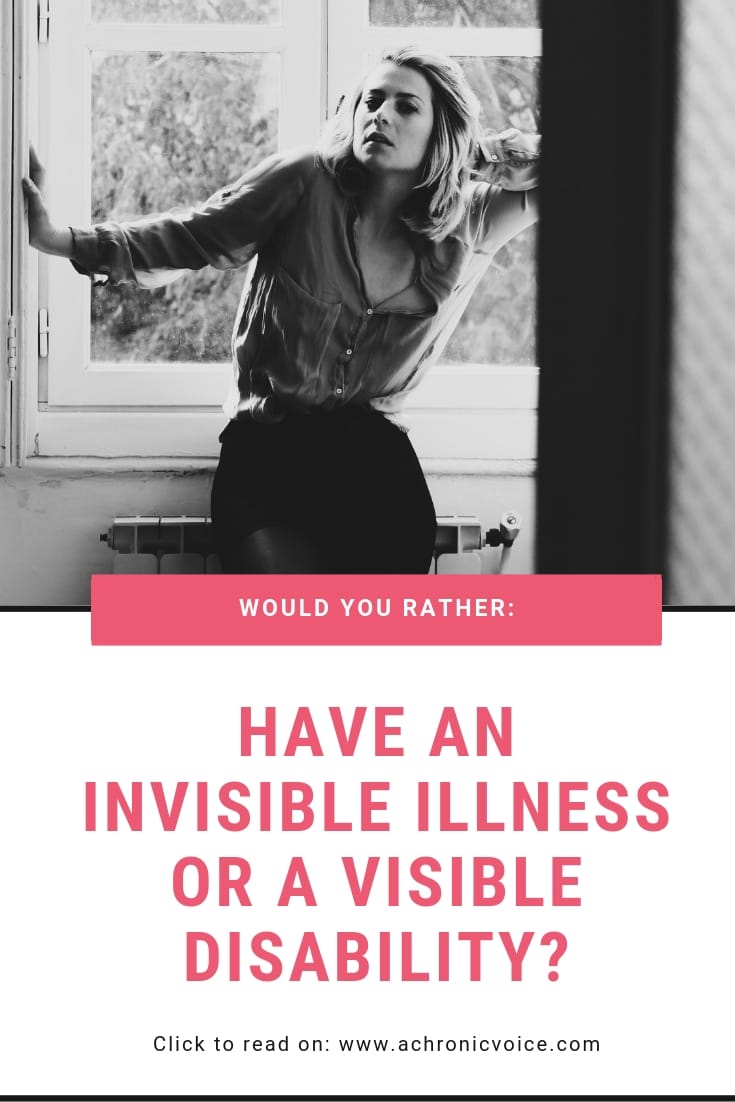
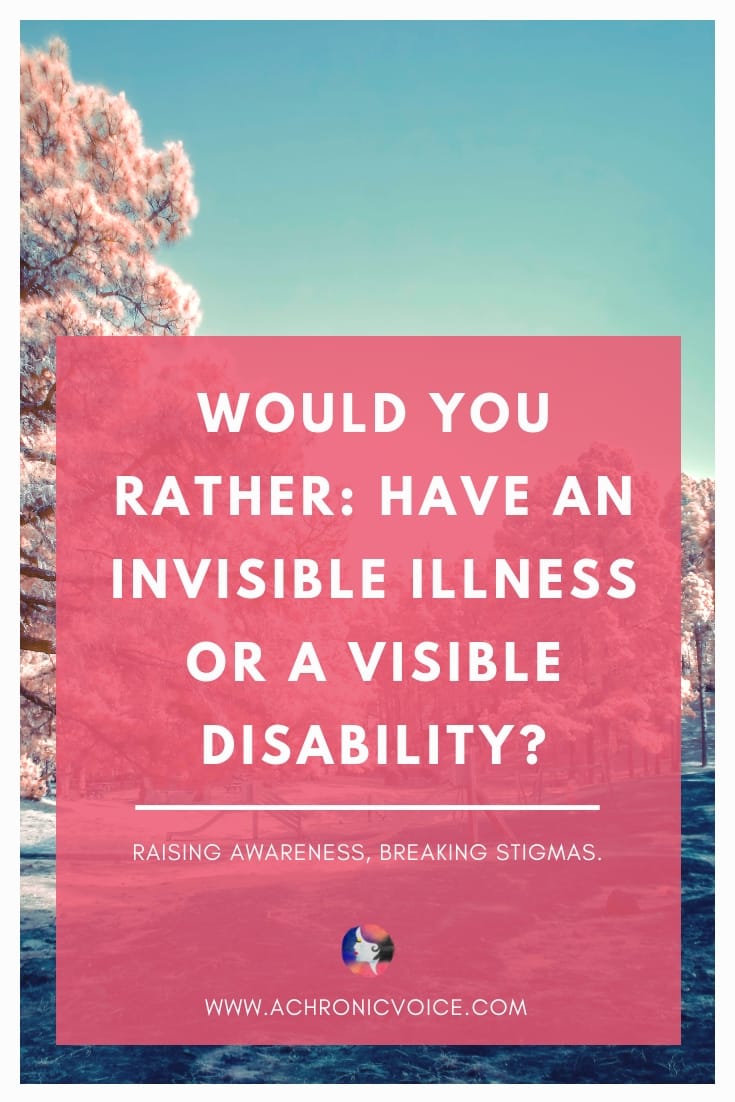
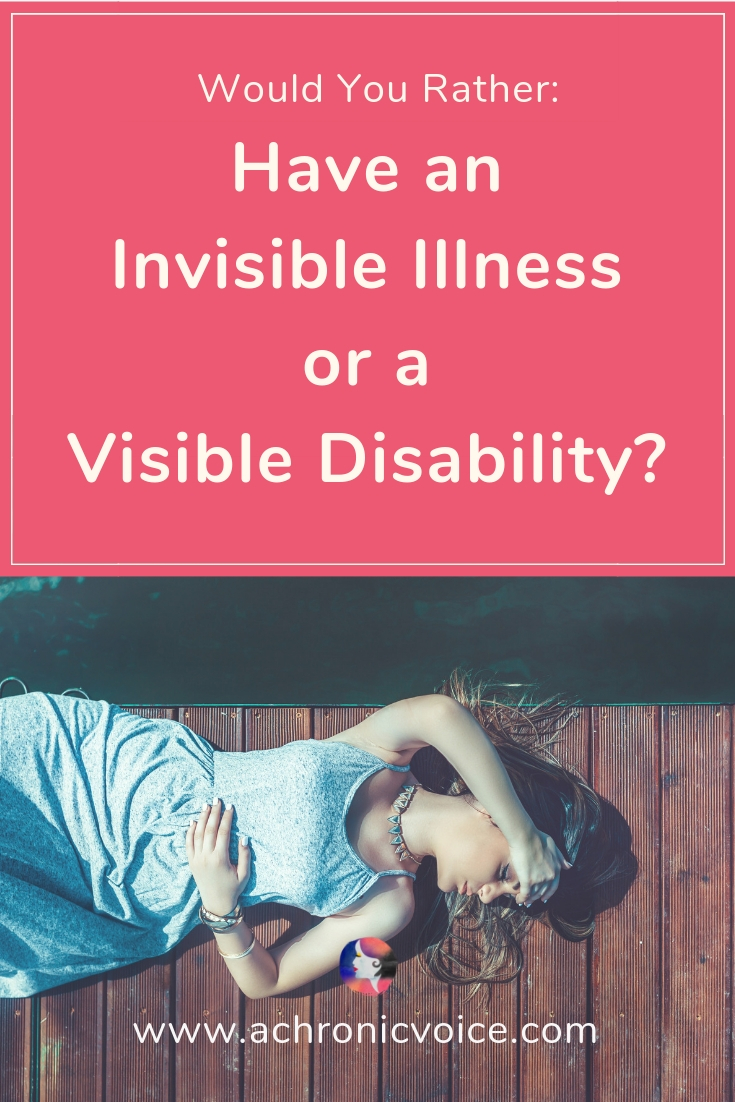
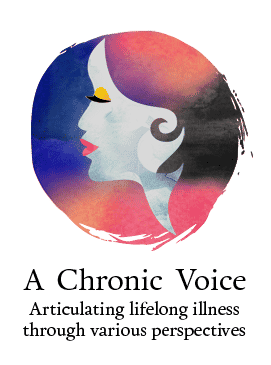
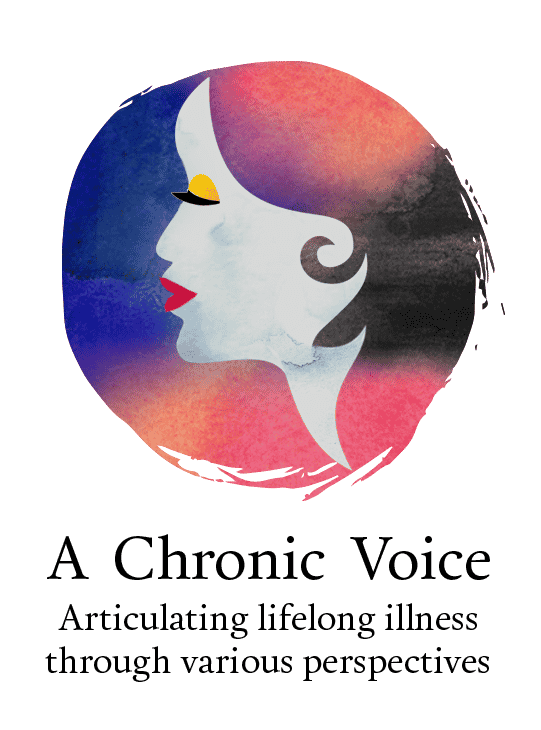
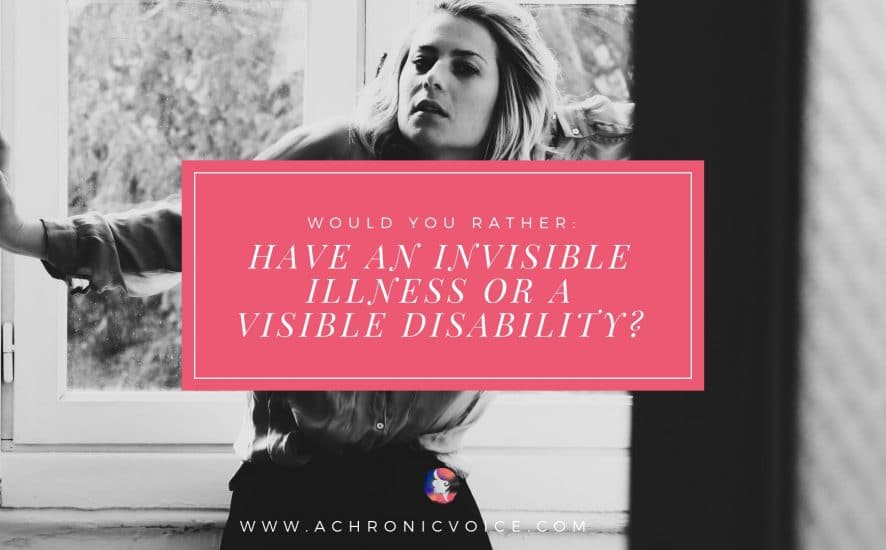
I think you’ve done a good job trying to balance this article. I am a person who has lived with a physical disability my entire life and within the last 20 years, has acquired autoimmune disorders and chronic invisible illnesses. The combination sucks. My life experiences with CP are directly opposite to some of the statements you’ve made in the article and I wish to correct those.
1. “People tend to be more accommodating, patient and empathetic, when they come across a physically disabled person in public places.”
This has not been my experience. When out in public either on my walker or in my wheelchair, people constantly cut me off by abruptly walking in front of me. It’s dangerous on the walker because I can fall (poor balance) and in the chair because I have to slam the breaks on (grab my rims and pull back to stop myself). There’s also little assistance in stores and I often feel utterly invisible as people stare through me and address my husband.
2. “Employers also seem more accepting and understanding in general, and nobody at work thinks that you’re faking your disability. ”
Again not my experience, I’ve had employers refuse to interview me once they see my equipment. I’ve had coworkers and managers believe that I am faking it to get attention and special treatment. Those same coworkers daily sabotaged my work and blame me. I’ve had managers daily calling me to their office to ask if “I think I can still physically meet the job requirements of my position.”
3. “Physical issues are also easier to visualise, since there is a frame of reference. Doctors and surgeons are able to examine them closer to some extent, and attempt to fix the problem (although success rates might differ).”
CP has, for decades, been viewed as a childhood disorder even though it doesn’t go away. Once I turned 18, all services stopped. I had access to nothing. I’ve spoken to my GPs, orthopedic surgeons, physiatrists, neurologists and every single one of them do not know what to do for me. The refrain is “you have CP (as if I don’t know) and you have to learn to live with it.” Meaning live with the ever increasing loss of function, the ever increasing levels of chronic severe pain (mine is a constant 8-9/10 and can go as high as 20/10. No access to pain killers – I’m viewed as an addict.
The list goes on, but that gives a little insight into my world.
I agree, there is no real answer here. We all have to take the lot we are given and live in acceptance for our own mental health and overall wellbeing. From there, we need to make the world more aware. I would love to think we humans would be more empathetic, but… this time of COVID-19 has sure eye-opening!
Yes this article was to provoke thought, I suppose. And to dare to ask certain questions that might be taboo, both to the healthy and disabled communities 🙂 I believe that the more something is spoken about, the less stigma there is surrounding it!
Great article and I can’t decide. I am an ambulatory wheelchair user that also relies on mobility aids, but if I can manage my time strictly and within 30 minutes being on my feet, I will leave those aids at home. Having a wheelchair or a mobility aid in Taiwan, as I’ve mentioned on my own site, doesn’t really do much for those of us here. We seem to be invisible. No one would go out of their way to move or even bother to keep the sidewalks clear. This is what frustrates me so much about Taiwan. That said, if I entered a restaurant in a wheelchair or had been in my wheelchair with that incident this time last year, that never would’ve happened. No one would ever threaten someone in a wheelchair, although I have had people try to move my wheelchair because they felt I was in the way.
When I’m out without mobility aids, that’s also tough because then people have to take me at my word when I say I have to sit or I need to sit on the first floor of your restaurant because I can’t do the stairs. Both aspects are so frustrating.
Now I just get loud. LOL. I’m also really vocal about places that are inaccessible here or that make things harder on people who are mobility compromised because they should also be considering the many seniors in Taiwan that have to navigate the daily obstacles that people regularly through in the way without thought or care. (A good example is people thinking they own the sidewalk, forcing seniors and patients out into the road to get where they are going.)
The judginess doesn’t go away when you’re in a wheelchair here either. I’ve been in a wheelchair at the hospital and had a senior woman sit on me just because the default here is ‘respect the elderly’. I think she saw a young looking woman in a wheelchair and no seats and just decided that she’d do that because she was older. It turns out she wasn’t even a patient! She was there with a patient. I never ever in my life ever expected someone to sit on me, and my husband was just so shocked. Yet it happens here because of cultural issues.
Anyways, blah blah blah. I always write a book chapter on your site. Great article, Sheryl!
Wow, I can’t imagine being treated as if you’re a piece of furniture! Crazy she would sit on you. What did you do?
Yes that’s absolutely crazy, Carrie, even for the whole respect to elderly Chinese culture! (Trust me, I’m Chinese! Lol.)
Yes, we’ve seen a lot more news about this here in Taiwan recently because it was seniors who didn’t want to follow mask mandates here and it was seniors that were ignoring the rules or thought they were above them. That really angered a lot of people here in general.
I would never disrespect a senior, even in my home country, unless they were being exceptionally disrespectful to me. Surprisingly, I’m very rarely told to go home to my own country, but when I have heard that, it has come from seniors. I find that a bit funny because a great many of them are ‘new to Taiwan’ themselves since so many families moved to Taiwan with the founding of the People’s Republic of China in 1949.
Yea we kind of have a similar issue in Singapore, and there was an article that outlined their thoughts and opinions. I guess many of them think that they’re already so old and near dying, so why bother. On top of other reasons. Old people can be stubborn, eccentric and cranky. And Asian seniors can be especially demanding of respect hehe 🙂
I tried to wiggle out from under her! IN MY CHAIR. Then my husband told her very loudly to get up in English because he doesn’t speak much Chinese. She moved because he’s big and he stood right in front of us and basically had to use his body to intimidate her to get her to move. Shame is a big thing here and people don’t like losing face, so she moved.
I was so sick that day and in such shock that anyone would do that, I honestly didn’t know how to react. In retrospect, I wish I had screamed or something, but then again, I had a rather large Taiwanese woman sitting on me.
My friends told me to take circular knitting needles with me the next time I’m waiting for my appointment. JAB JAB.
Hahaha… I like your friends’ suggestions. Arm your wheelchair good… spikes everywhere but no, just carrying my ‘hobby’ around.
Yes since writing this article a few years ago, I do realise it isn’t black and white for many people either. But I hope this article provokes some thought within society, too! 😀
For the longest time, my illness was invisible. Then, in the last five years I’ve had a visible disability and it’s visible because I use walking sticks. It was a strange transition between invisible to visible. In all the health issues I faced, I have always wished that if I could choose to get rid of the visible or the invisible illness, it’s the invisible I’ve always wanted to get rid of not because people are more careful with me because of my visible disability but because my invisible issues cause me so much more pain.
But that’s obviously because I am comparing. The invisible eats away at my quality of life far more than the visible. So I guess if I had the choice, I’d stick to the visible disability I have and get rid of the invisible I have.
Personal choice based on my conditions.
It’s really not a question that we can choose from I suppose, but it really did get me thinking, and I wanted to voice my thoughts out loud no matter how blasphemous it may sound 🙂 I believe that the more something is spoken about, the less the stigma surrounding it. And that is my final goal.
It’s a difficult and sensitive subject (which wrote about so well!) and I have thought about it many times. There are definitely pros and cons, although I do not have a visible disability so perhaps I cannot reflect on that adequately. When I wear a ‘please offer me a seat’ badge on public transport occasionally I have been heartened that I was offered a seat without asking, but I also noticed the stares as I look fairly young and healthy.
Yes being young and healthy-ish looking has cons of its own, though hopefully we stay young forever, ha! It is indeed a super sensitive topic, but I wanted to bite the bullet anyway. I think they are issues that need spoken more about, as some may be fearful to question or ask, which just perpetuates stigma.
I have both but find the mocking and looks that I get from my visible disability most difficult, it often prevents me from leaving the house. People often avoid talking to me when they notice my speech problem. It’s very lonely and makes me feel less of a human and very inadequate. My invisible disabilities come with issues and judgements too but I find them easier to deal with.
Hi Suzi, thank you so much for sharing, the insight you provide is valuable. I guess people don’t quite know how to respond when they can’t relate, although unkind behaviours are uncalled for, and being kind doesn’t hurt. I hope that over time, the awareness we are trying to raise will make an impact on people’s attitudes toward both the visibly and invisibly disabled.
A very sensitive subject indeed but you have really done a good job by writing about it . Mine too is a invisible illness . I have a #Jpouch ,which gives me a hard time going out even for short period of time. My problem is my BM COUNTS . I can’t stand in lines outside the restroom facilities. Sometimes I am at the verge of crying when I can’t find one nearby . No one around understands my plight except my immediate family. One cannot make the surrounding people understand these difficulties. I don’t carry any badge saying “ I have a Pouch which can leak ,please let me go first”. I think any invisible chronic condition is at risk of getting weird looks in public places . Can we change that ? Perhaps NO. Thank you Sheryl for taking this untouched subject.
Thank you for sharing. I can only imagine how frustrating that must be for you 🙁 Maybe we should print our own education badges or flyers so we can hand one out quickly. While they’re taking it we can dash into the bathroom first 😉 I don’t know, but there has to be an easier way!
I think I would rather stay as I am. I use my mobility devices as I need them. Yes, I get looks when I get out of my car standing and get into my wheelchair but I would rather deal with that than to have no choice. I do not have a handicap sticker so I leave the handicap spaces for the others. (although I do qualify for one)
I have just had to toughen up and not worry about the looks people give or the rude words some people say. I try to use those as opportunities to educate rather than allow it to break me down.
Mary Frey of “The Frey Life” vlogs about this a lot and I love her attitude!
Jen @ TheFrozenMind.com
Thanks for the reference and for sharing your thoughts! It’s definitely not easy to ignore the immediate world around you, but we do what we must to live a good life indeed. Great job and remember that we are all behind you, and believe you 🙂 x
Another great and thought-provoking article Sheryl. While most of the time my disability is invisible, when I exercise and fly I make it visible by using oxygen. So I get the best (and worst) of both worlds! For the most part I’m grateful that I can fly under the radar and look healthy most of the time. But I’m sure if I had to wear the oxygen 24/7 I’d get better accustomed to the weird looks and feel less weird about sitting in a reserved seat. Either way, I myself try to be as openminded about everyone I encounter since you never know what’s going on under the hood.
Hi Sarah, thank you for taking the time to read this and to share your thoughts! It’s a touchy subject and without reading, easy to misunderstand! I have changed the title from ‘physical’ to ‘visible’ as someone correctly pointed out, physical disability can also be invisible, sadly 🙁 I agree these days I make it more obvious myself, heh. I just squat in elevators doubled over if I have to – no more dignities of my 20 year old self ;p And planes you should definitely make it obvious. Even a short trip knocks the wind out of me and requires a whole day or two of recovery after. I wish you many more happy trips to come though x
I found this so interesting to read Sheryl. As someone with MS, I have mobility difficulties but lots of invisible difficulties too – cog fog, fatigue and chronic pain to name a few. I have to say that when I started using my crutches and scooter, I finally felt ‘believed’. I don’t have to worry about putting my disabled badge on my car and worry that people are going to think that I am a fake. But there are problems too – a distinct lack of access around the UK and abroad and believe it or not I get a lot of ‘looks’ from older people with mobility aids as though I am making it up. For example, I may stop my scooter on the pavement to wait for an elderly person using a walker or a cane and they don’t look at me or say thank you. It’s frustrating but I have got used to it I guess xx
Hi Jenny, thanks for reading and sharing your thoughts. So important to hear from actual people themselves! When I first wrote this in 2016, I wasn’t even thinking about those with a combination of both (have since updated it with a paragraph at the end). Over the years I’ve become more aware through reading blogs (thanks to people like you!). It’s definitely such a tricky thing, hey? And you’re right, I actually seem to get judged the most from the older folks outside. Many of them have this ‘right of way’ attitude that borders on dismissive. This might be due to cultural reasons too, with the whole Confucianism philosophy we’re raised on, where we’re supposed to respect the elderly and that they come first! I guess all we can work on is our own sense of self-confidence and self-worth – I find that that helps a lot with most everything in life! People seem to naturally believe in you too when you express a quiet, genuine sense of that. Sending you good vibes for the weekend! 🙂 xxx